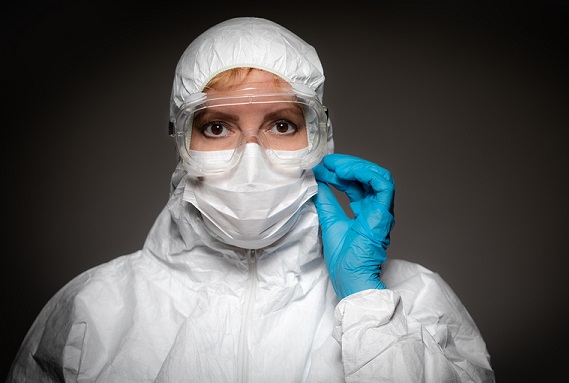 Healthcare workers have suddenly been thrust into this role of first responders, says Bethany Marshall, who holds a doctorate in Psychoanalysis. But, they don't have the benefit of training, protocol, and protections afforded to traditional first responders such as firefighters, police officers, and EMS. "Disaster response is different than normal medicine", says Dr. Marshall. "During a disaster, existing infrastructure and procedures are overwhelmed, and the normal rules cease to apply."
Healthcare workers have suddenly been thrust into this role of first responders, says Bethany Marshall, who holds a doctorate in Psychoanalysis. But, they don't have the benefit of training, protocol, and protections afforded to traditional first responders such as firefighters, police officers, and EMS. "Disaster response is different than normal medicine", says Dr. Marshall. "During a disaster, existing infrastructure and procedures are overwhelmed, and the normal rules cease to apply."
Officials at the Centers for Disease Control say there are things all first responders can do to try to reduce secondary traumatic stress reactions. The first is acknowledging that these reactions can happen. Symptoms range from the physical (like fatigue and illness) to mental (fear, withdrawal, guilt). It's important to allow time for you and your family to recover from responding to the pandemic. Perhaps it's helpful to make a menu of self-care activities you enjoy. It could be spending time with friends and family, exercising, or reading a book. Make sure you take a break from media coverage of the pandemic. And, ask for help if you feel overwhelmed or concerned COVID-19 is affecting how you care for your family and patients.
Dr. Marshall says this is especially difficult for medical professionals, since they're "often motivated by altruism and the desire to help others. They need to give themselves permission to process feelings of fear, compassion, fatigue, the desire to protect themselves, and criticism toward patients who are putting them at risk." That said, there are things healthcare workers can do to help manage their mental health during the pandemic.
First, Dr. Marshall says, stay focused. Be clear about your role in responding to the crisis. Stick to your job. Be aware of signs of burnout, such as emotional numbing, isolation, withdrawal, critical feelings towards patients, compassion fatigue, excessive worry, nightmares, intrusive thoughts and images. Limit working to twelve hour shifts, remind yourself that taking breaks is not selfish, working around the clock does not necessarily mean you will be more helpful, and there are other qualified people who will step in when you step away. Limit caffeine and alcohol, practice breathing and relaxation techniques, and take care of basic needs such as nutrition, exercise and sleep.
Teams of healthcare workers can help to look out for each other. Dr. Marshall says "high levels of team accomplishment, assurance of personal and team capabilities, and bonding with one's team like a family are associated with reduced stress levels." It's important for coworkers to support each other, encouraging colleagues to take breaks and monitor stress. Setting up a "buddy system" to help each other with basic needs can go a long way.
Family members can help as well. The healthcare worker should make sure to manage expectations, and talk to loved ones about working long hours. Come up with ways family members can contact you and keep expectations realistic to take the pressure off yourself. Make sure to talk to your loved ones about what you're going through. Friends and family members can encourage these discussions by asking the healthcare worker how they are feeling, and validating those emotions. Ask direct questions about what they're experiencing, but respect their boundaries if they don't want to share information. Dr. Marshall says it's helpful if others point out the healthcare worker's points of resiliency, such as skills, compassion, training, and intellect. And everyone can pitch in to help with basic life tasks such as childcare, grocery shopping, household errands, and cleaning, so they can preserve their energy.
Some cities are already working to mitigate the toll COVID-19 is taking on healthcare workers. San Francisco has launched a program offering short-term mental health and counseling services for all health workers. The Heal San Francisco program involves nearly 400 licensed clinicians volunteering to help healthcare staff on the front lines deal with trauma and stress. It covers those in the public, private, and non-profit health care fields. In a webinar for the program,
Dr. Joyce Dorado says it's all about resilience. "Resilience is really the ability to bounce back from adversity", says Dr. Dorado. "Resilience is really being able to face down sometimes a brutal reality of what is, but also maintaining a staunch optimism that we can overcome it, that we are overcoming it. So part of that is recognizing that we can cope, we've got what it takes to get through this."
Kim Lucey is a freelance journalist with more than a decade of experience in the field. Her career has included coverage of big breaking news events like the Sandy Hook school shooting, lockdown in Watertown, MA following the Boston marathon bombings, and Superstorm Sandy. Her in-depth reports have garnered awards, including a focus on treating mental health issues in children. Currently, she is a reporter at a television station covering the news across the Greater Boston Area with an appreciation for fact-finding and storytelling. Follow Kim on Facebook and Twitter.